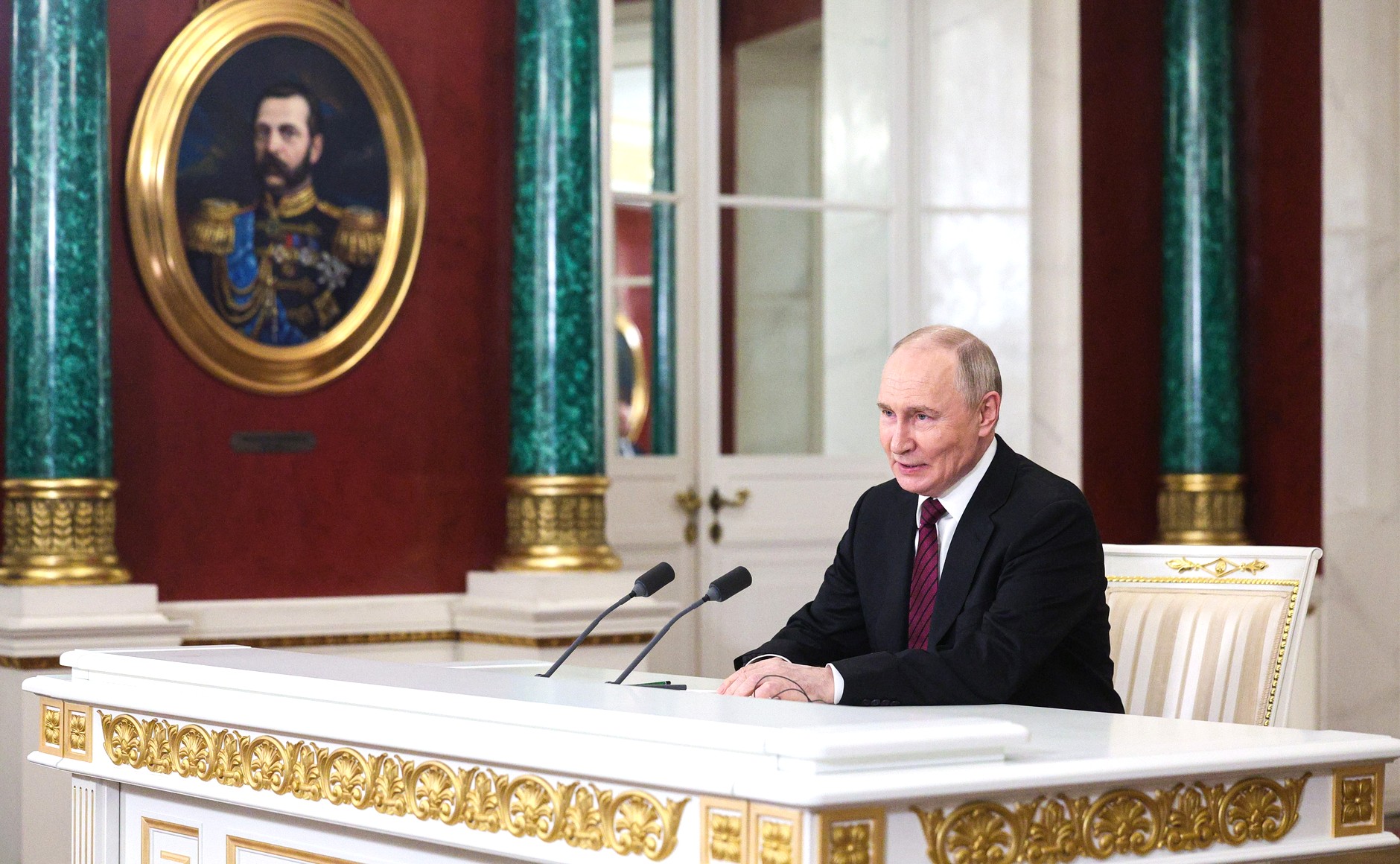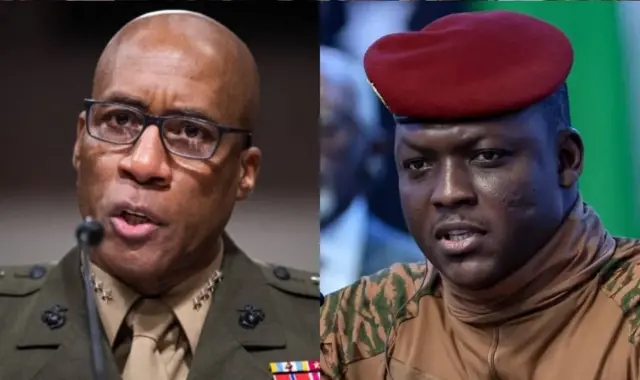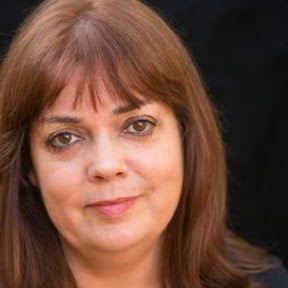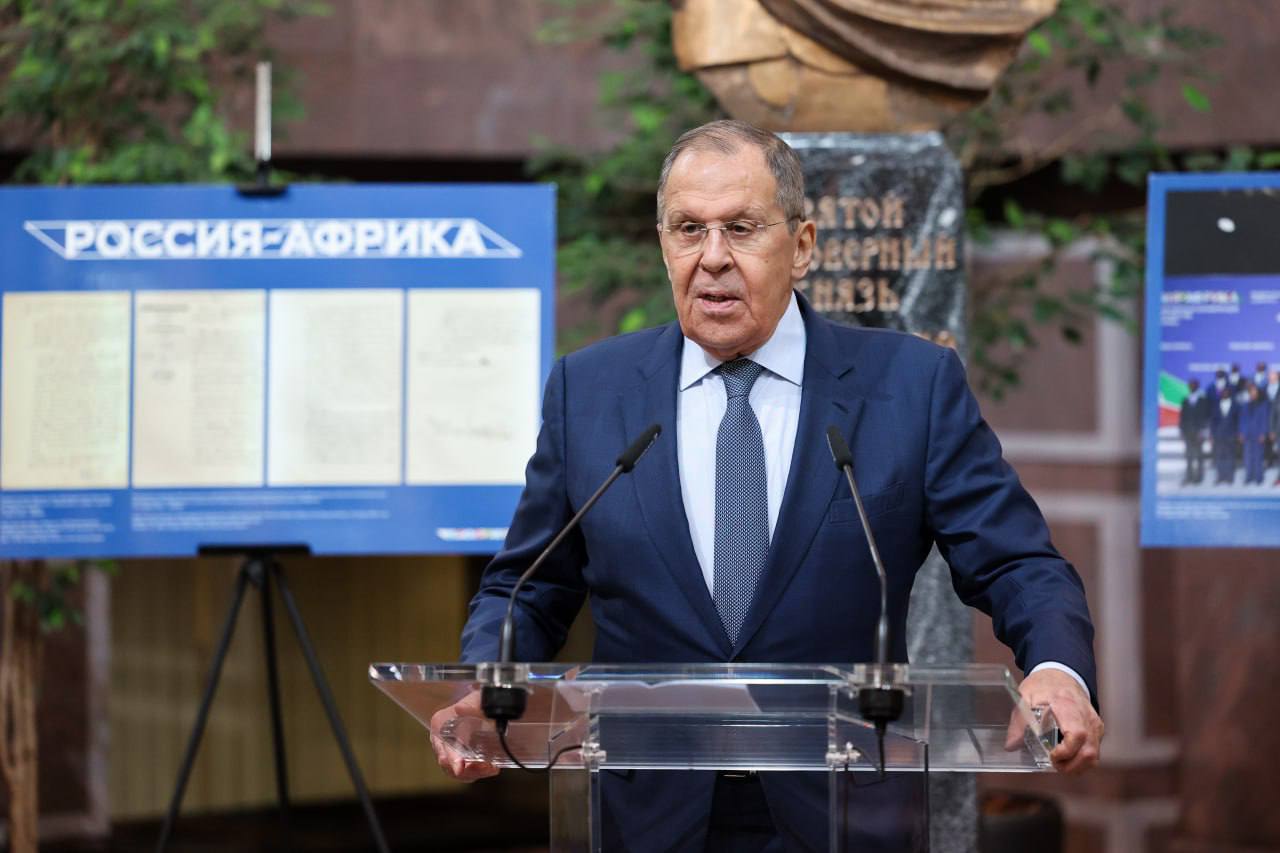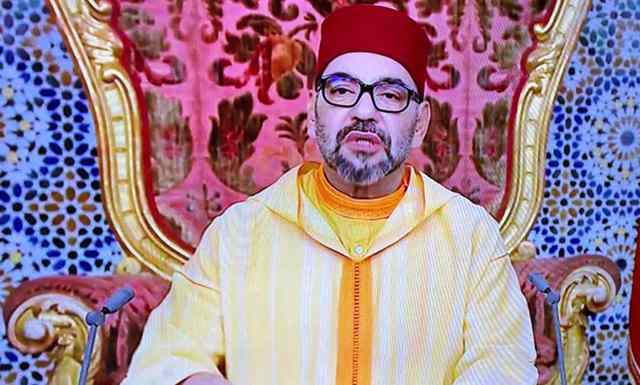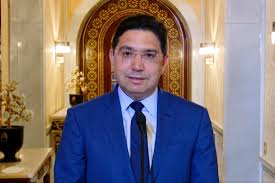
Morocco's foreign minister Nasser Bourita (C) moroccolatestnews.com
Despite Washington’s about-face on Western Sahara, the erstwhile darling of U.S. policy circles is more isolated than ever.
By Samia Errazzouki, a doctoral candidate in history at the University of California, Davis

January 4, 2022, 10:24 AM
For a long time, Morocco was a darling in Washington’s policy circles. The country is often hailed as the first to recognize U.S. independence (in 1777), and little has stood in the way of Moroccan-U.S. relations since. The kingdom’s lobbying efforts, for one, have historically not required much heavy lifting to sway U.S. lawmakers on both sides of the aisle to pass legislation aligned with its interests.
Today, however, the once unshakable bipartisan U.S. consensus on Morocco has shifted away from unwavering support. The most recent reflection of this trend is unprecedented Morocco-skeptic language introduced in the appropriations bill and the National Defense Authorization Act (NDAA) for fiscal year 2022. While the draft of the U.S. Senate’s 2022 appropriations bill must undergo negotiations with the House, the NDAA has passed both chambers of Congress. Both pieces of legislation risk souring the centuries-long ties between these two historic allies.
To be sure, the United States is not the only country with whom Morocco has faced recent diplomatic losses. For the past year, headlines have painted a worrying picture of Moroccan diplomacy in decline. This has left the country relatively isolated, even among its traditional allies.
In March 2021, Morocco severed official diplomatic communication with Germany over a series of what it characterized as “deep disagreements.” In May 2021, Morocco withdrew its ambassador to Spain and eased border restrictions with the Spanish enclave of Ceuta, located in North Africa, causing an influx of thousands of migrants—many of them unaccompanied minors—into Spanish and European Union territory.
The move prompted the European Parliament to pass a resolution that found Morocco in breach of the U.N. Convention on the Rights of the Child. In July 2021, reports alleged that Moroccan intelligence agents hacked the phone of French President Emmanuel Macron as well as a number of French officials and journalists. France, a usually staunch supporter of its former colony, has since grown mum. In September 2021, the EU Court of Justice annulled agriculture and fisheries trade between Morocco and the EU.
The common thread in all of these rows has been the deterioration of Morocco’s once dynamic diplomatic corps following the appointment of Nasser Bourita, a junior bureaucrat with no party affiliation and a relatively thin résumé, as Morocco’s foreign minister in 2017. During his tenure, Morocco has never been more alienated from its neighbors and allies.
“There is a general consensus among former and current diplomats that the state of Moroccan diplomacy has reached its lowest point since independence,” said a veteran Moroccan diplomat, who spoke to Foreign Policy on the condition of anonymity for fear of retribution. He described current Moroccan diplomacy in two words: “erratic and mediocre.”
Now, Moroccan interests stand to lose the support of its oldest and strongest ally: the United States. Things began to go awry for Morocco after it landed itself in 2016 U.S. presidential campaign crosshairs, when it was reported that King Mohammed VI had pledged $12 million to the Clinton Foundation in 2015.
Quickly, the Donald Trump campaign incorporated the report into its talking points as an alleged example of candidate Hillary Clinton engaging in “pay for play.” Throughout the duration of Trump’s subsequent term as president, he held no official meetings with King Mohammed VI. The closest the two heads of state came to a rendezvous was when photos of them at the 2018 Armistice Day ceremony in France went viral: Trump could be seen glaring at a sleepy Mohammed VI.
And then, in the final weeks of Trump’s term, he issued a proclamation that recognized Morocco’s sovereignty over the disputed Western Sahara territory in exchange for Morocco’s normalization of ties with Israel. The move immediately solicited bipartisan condemnation in Washington.
Republican Sen. Jim Inhofe and Democratic Sen. Patrick Leahy have been at the forefront of this criticism, which has continued into the Biden administration. Both Inhofe and Leahy authored a February 2021 Senate letter addressed to U.S. President Joe Biden, urging him to reverse Trump’s decision, which they characterized as endorsing “the Kingdom of Morocco’s illegitimate claims of sovereignty over Western Sahara.”
The Western Saharan conflict emerged after the territory’s independence from Spanish colonial rule in the 1970s. The pro-liberation Polisario Front quickly redirected its armed struggle against Morocco when the kingdom seized control of Western Sahara in 1975, and it was not until 1991 that the two parties agreed to the terms of a U.N.-brokered cease-fire agreement pledging to hold a referendum on the territory’s status. More than 30 years later, the vote has yet to take place despite the overwhelming support of the international community and United Nations.
Drafts for fiscal year 2022’s appropriations bill and NDAA include significant changes on Morocco and Western Sahara.
Inhofe serves as the ranking member for the Senate Armed Services Committee and Leahy as chairman of the Appropriations Committee, so Senate drafts for fiscal year 2022’s appropriations bill and NDAA include significant changes on Morocco and Western Sahara in comparison to past years.
In past versions of the bill—which, among other things, outlines appropriations for the State Department and other U.S. foreign operations—Western Sahara-related provisions had been placed under the section on Morocco. “We didn’t think it was a reflection of either reality or international law,” said Tim Rieser, senior foreign-policy aide to Leahy and Democratic clerk for the Appropriations subcommittee on state and foreign operations. “So the first thing we did in the Senate was separate out Western Sahara and put it under its own heading as a general provision.”
Inhofe echoed this sentiment: “This particular section should be protected as it moves through the negotiation process,” he told Foreign Policy in an email. Crediting Leahy for the strong language, Inhofe added, “it sends a strong message to the Biden administration—this is a priority for Congress, so you need to make it a priority as well.”
If the appropriations bill survives the House’s negotiation process, the placement of Western Sahara as its own heading is just one of several changes that could mark a turning point in Morocco-U.S. relations. The draft also opposes the use of funding for the construction of a U.S. consulate in Western Sahara, reversing the previous administration’s nominal inauguration of what was eventually going to be a consulate in the disputed territory.
Additionally, the NDAA, which covers appropriations for the U.S. military, limits the use of funds for any military exercises with Morocco unless the U.S. secretary of defense “determines and certifies to the congressional defense committees that the Kingdom of Morocco has taken steps to support a final peace agreement with Western Sahara.”
Having passed both the Senate and the House, there is a significant likelihood that this year’s annual African Lion military exercises, U.S. Africa Command’s largest exercise, would skip over Morocco entirely. With the exception of a pandemic-related pause in 2020, the last time the African Lion exercises excluded Morocco was in 2013, when Morocco protested U.S. support for a human rights monitoring mandate as part of the United Nations peacekeeping mission in Western Sahara. In response, the United States reversed its support of the mandate.
Many had anticipated that, under the Biden administration, there would be another push for including a human rights mandate in the U.N. peacekeeping mission in Western Sahara, known as Minurso. Not only is the United States the penholder of the Security Council resolution that determines the mandate and length of Minurso, but U.S. Secretary of State Antony Blinken has repeatedly reaffirmed Biden’s campaign promise of “putting human rights back at the center of American foreign policy.”
Both Inhofe and Leahy, along with several other senators, including Ohio Democrat Sherrod Brown and Vermont Independent Bernie Sanders, signed an October 2021 letter to Blinken, calling on the inclusion of a human rights monitoring mandate in the renewal of Minurso. On Oct. 29, 2021, the Security Council passed a resolution that renewed Minurso without a human rights monitoring mandate. Inhofe characterized the human rights language in the resolution as “toothless” in his email to Foreign Policy.
Many have been frustrated by the Biden administration’s ambiguity on its position regarding Western Sahara. “What they appear to being doing is to stake out this ‘neutral’ position where they have not affirmatively embraced the Trump policy but neither have they rejected it,” Rieser said. For Inhofe, time is ticking: “At this point, more than 10 months into the new administration, I just want to see some action.”
Responding to these frustrations, a State Department spokesperson said “the Administration’s priority is restarting a credible political process, leading to an enduring, dignified, and internationally supported solution to the Western Sahara conflict. We warmly welcome Staffan de Mistura’s appointment as the U.N. Personal Envoy of the Secretary-General and will actively support his efforts.”
De Mistura joins a long line of U.N. envoys for Western Sahara who have failed to secure a resolution. Former U.S. Ambassador Christopher Ross served in the role until his resignation in 2017. For him, there are two factors the current envoy will have to face: a restricted mandate and Morocco’s defiance of Security Council directives. “Our mandate is limited to facilitating meetings between the parties,” Ross said. “If the new envoy is going to be limited to that same role of just facilitating meetings, he’s not going to make any progress whatsoever.”
Ross characterized Morocco’s record of compliance with Security Council directives—namely, that all parties should engage in negotiations “in good faith and without preconditions” and Minurso should have free access to all interlocutors—as “very bad.” Morocco has not only refused to discuss any other proposal other than its autonomy plan, but it has limited Minurso’s access to people in the area under its mandate. “Morocco acts with impunity,” Ross said, arguing Morocco is the major reason why no progress has been made.
Put into context with Morocco’s recent diplomatic spats and rows under Bourita, Ross said, “there’s a lack of positive movement in Moroccan diplomacy”—a view shared by others. To mend this image, Morocco has touted its normalization deal with Israel as an example of its amenability, even though the two countries have long engaged in a range of cooperation since the mid-20th century. Morocco has relied on this deal as an alternative avenue for its lobbying efforts, placing one particular figure at the forefront of its charm offensive abroad: Israeli-Moroccan Rabbi Yoshiyahu Yosef Pinto.
Prior to his recent appointment as the chief rabbinical authority who oversees kashrut in Morocco—the dietary laws that qualify food as kosher—Pinto was convicted in Israel over attempted bribery charges, resulting in a one-year prison sentence. Pinto maintains a relatively active social media presence, where he displays a medley of posts spanning from snapshots in a private jet to photo-ops with politicians and diplomats.
Pinto’s elevation from convict to rabbinical leader without any input from the Moroccan Jewish community reflects the insulated nature of decision-making in Morocco, including on foreign policy. “Up until a few years ago, foreign-policy decisions would be the result of a collegial group of advisors that would give their recommendations to King Mohammed VI,” the veteran Moroccan diplomat said. Many senior officials who once had the king’s ear have now been pushed out, resulting in an echo chamber that left many former diplomats demoralized and concerned that Morocco is headed down a worrying foreign-policy path.
Morocco’s foreign ministry did not respond to a request for comment.
This outlook is even more grim when placed alongside recent domestic indicators: The country’s unemployment rate has reached its highest point since 2001, human rights and freedom of expression are rapidly deteriorating, and many people are growing frustrated with the state’s management of the pandemic, which has been marred by last-minute, poorly communicated, and heavily restrictive policies.
Historically and by virtue of its geographic location, one of Morocco’s strengths has always been its ability to navigate the fluctuating tides of international diplomacy. Amid tensions with its allies and mounting aggression with its foes—including the escalation of violence with Algeria and the Polisario Front—Morocco faces the risk of a dangerous slide into isolation and hostility. With its aggressive approach to diplomacy, Morocco is doing very little to steer the region away from a bleak future of conflict and instability.
Samia Errazzouki is a doctoral candidate in history at the University of California, Davis. She is a former Morocco-based journalist. Twitter: @S_Errazzouki
© foreign Policy.com




